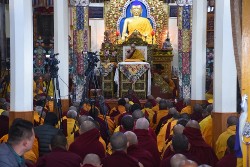Tibetet Segítő Társaság Sambhala Tibet Központ
Tibet Support Association Sambhala Tibet Center
székhely / telephely H-Budapest I. Attila út 123..
(00-36) 70 431 9343 (00-36)70 944 0260 (06-1)782 7721
sambhala@tibet.hu www.tibet.hu tibetpress.info
Facebook/Sambhala Tibet Központ Facebook/Tibett Segítő Társaság
MagnetBank/ 16200010-00110240
IBAN/HU94 16200010 00110240 00000000 SWIFT/HBWEHUHB
(1%) adószám/ 18061347-1-41
nyitva tartás/hétköznap 12.00-20.00 hétvégén előadás függő
» Retro» Tibeti művészet» Interjú» Levelek» Tibet Press» Tibet Press English» Dharma Press» Human Rights» Világ» Kína» Magyar» Ujgur» Belső-Mongólia » KőrösiCsoma» Élettér» Határozatok» Nyilatkozatok» tibeti művészet» lapszemle.hu» thetibetpost.com» eastinfo.hu» rangzen.net» ChoegyalTenzin» tibet.net» phayul.com» DalaiLama.com» vilaghelyzete.blogspot.com» Videók» Linkek» TibetiHírek» Szerkesztőség
A Dalai Láma: Az emigrációban újjáéled a tibeti kultúra, identitás, és vallás
2019. február 19./Phayul.com/TibetPress
eredeti cikk
By Tenzin Dharpo DHARAMSHALA, Feb. 19: The Tibetan leader His Holiness the Dalai Lama remarked that the Tibetan culture, religion and identity have been greatly revitalized after coming into exile on Chotrul Dhuechen, the great prayer festival here today at the Tsuglakhang temple.
DHARAMSHALA, Feb. 19: The Tibetan leader His Holiness the Dalai Lama remarked that the Tibetan culture, religion and identity have been greatly revitalized after coming into exile on Chotrul Dhuechen, the great prayer festival here today at the Tsuglakhang temple.
After the teaching, he lauded the Tibetans in exile and its setup for having been successful in preserving Tibetan religion and culture and thanked the several generations of civil servants in exile for doing their best.
“As being rendered into exile has proven to be a blessing in disguise, bringing all the Tibetans from the three provinces of Tibet to realize the common nationalism we share,” he said, “we must further persevere to preserve our culture to mitigate the stress felt by the Tibetans in Tibet.”
Commenting on the Sino-Tibet relationship, he said since Buddhism promotes the coexistence of all realms of existence, working with close to 400 million Chinese Buddhists is a practical thing to do.
“We are at a cusp of change and nearing a resolution for the Tibetan issue so it is important to view the situation from a holistic point and not be bogged down by looking at things from a singular perspective,” he further said.
The octogenarian Tibetan leader also said that the hardships of past decades have borne positive results in reinventing and revitalising many aspects of Tibetan politics, religion, culture, and particularly religious dynamics.
“These days, Tibetan Buddhism is seen as a unique religion that draws interest not only from its followers but academics and scientists who can learn from the ancient wisdom. The repository of all of which survive now in Tibetan language, hence we are at a position to benefit all of man-kind,” he said.
The Chotrul Dhuechen, one of the four major Buddhist festivals is observed by Tibetan Buddhists on the 15th day of the first Tibetan month. Today the Dalai Lama gave teachings on the ‘Jataka Tales’, the Eight Verses of Mind Training and the Praise to the 17 Nalanda masters.
The teaching today marks the first religious gathering of the calendar year here at the Tsuglakhang, the Dalai Lama’s temple and base in exile. Beginning tomorrow, the foremost figure in the Buddhist world will give five days of teachings on Bhavaviveka's Essence of the Middle Way (Madhyamakahrdayakarika/ Tib. Uma Nyingpo). On February 27, there will be a ‘long life prayer’ to be offered to him by four separate groups, his private office announced.
The great Monlam festival was instituted by Je Tsongkhapa, the founder of the Gelug tradition of Tibetan Buddhism in 1409 and later reinstated by the second Dalai Lama Gendun Gyatso Palzangpo in 1518, as the abbot of the Drepung monastery.
In Tibet, thousands of monks (of the three main monasteries of Drepung, Sera and Ganden) used to gather for chanting prayers and performing religious rituals at the Jokhang Temple in Lhasa.
The prayer festival was missed from 1959-60 in exile in an atmosphere replete with challenges posed by new life in exile. As it has become a tradition by now, His Holiness the Dalai Lama gave teaching on Jataka tales on Chotrul Duechen, also known as the Chonga Chopa.
The temple was packed with an estimated 3000-4000 attendees from all over the world, many visiting the town and the country specifically for the teaching.
His Holiness chose to give the teaching from inside the main temple instead of the usual dais downstairs because of the low temperature and commented thus on the cold weather, “the weather must have greeted the people from South India in such a way that it will be etched in the memory forever.”
